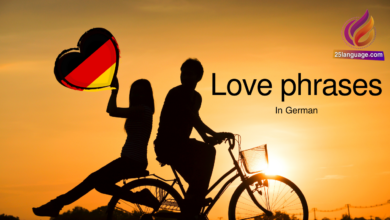Comparative and Superlative in German

Comparative and Superlative in German.In German, the formation of the comparative and superlative forms of adjectives and adverbs is quite structured. Here’s an overview of how these forms are created, along with their English translations:
- Positive Form (Grundform): This is the basic form of the adjective or adverb.
- German Example: “schnell” (fast)
- English Translation: “fast”
- Comparative Form (Komparativ): This form is used to compare two entities. It is typically formed by adding “-er” to the end of the adjective or adverb. For English, “more” or the suffix “-er” is used.
- German Example: “schneller” (faster)
- English Translation: “faster”
- Superlative Form (Superlativ): This form is used to express the highest degree of something within a group or the most extreme quality. In German, it is typically formed in two ways:
- For attributive use (when used with a noun), add “am” to the beginning and “-sten” (or “-esten” after a sibilant like “s”, “ß”, “z”) to the end of the adjective or adverb.
- For predicative use (when used without a direct noun), add “-sten” (or “-esten”) to the adjective or adverb.
In English, “the most” or the suffix “-est” is used.
- German Example (Attributive): “am schnellsten” (the fastest)
- German Example (Predicative): “schnellsten” (fastest)
- English Translation: “the fastest”
It’s important to note that there are irregular adjectives and adverbs in German where these rules don’t apply, and their comparative and superlative forms must be memorized separately. For example, “gut” (good) becomes “besser” (better) and “am besten” (the best).
Examples
Here’s a table showing examples of adjectives in their positive, comparative, and superlative forms in German, along with their English translations:
| German (Positive) | English (Positive) | German (Comparative) | English (Comparative) | German (Superlative) | English (Superlative) |
|---|---|---|---|---|---|
| groß | big | größer | bigger | am größten | the biggest |
| klein | small | kleiner | smaller | am kleinsten | the smallest |
| schnell | fast | schneller | faster | am schnellsten | the fastest |
| langsam | slow | langsamer | slower | am langsamsten | the slowest |
| gut | good | besser | better | am besten | the best |
| schlecht | bad | schlechter | worse | am schlechtesten | the worst |
| alt | old | älter | older | am ältesten | the oldest |
| jung | young | jünger | younger | am jüngsten | the youngest |
| hoch | high | höher | higher | am höchsten | the highest |
| niedrig | low | niedriger | lower | am niedrigsten | the lowest |
| teuer | expensive | teurer | more expensive | am teuersten | the most expensive |
| billig | cheap | billiger | cheaper | am billigsten | the cheapest |
| schön | beautiful | schöner | more beautiful | am schönsten | the most beautiful |
| hässlich | ugly | hässlicher | uglier | am hässlichsten | the ugliest |
| interessant | interesting | interessanter | more interesting | am interessantesten | the most interesting |
This table provides a clear comparison of common adjectives in their various forms, showcasing the structure of the German language in relation to English.
Sentences
Here’s a table with sentences illustrating the use of comparative and superlative forms in German, along with their English translations:
| German Sentence (Comparative) | English Translation (Comparative) | German Sentence (Superlative) | English Translation (Superlative) |
|---|---|---|---|
| Mein Haus ist größer als dein Haus. | My house is bigger than your house. | Das ist das größte Haus in der Stadt. | That is the biggest house in the city. |
| Er läuft schneller als sie. | He runs faster than she does. | Er ist der schnellste Läufer im Team. | He is the fastest runner on the team. |
| Dieser Apfel ist süßer als jener. | This apple is sweeter than that one. | Das ist der süßeste Apfel der Welt. | That is the sweetest apple in the world. |
| Sie ist klüger als ihr Bruder. | She is smarter than her brother. | Sie ist die klügste Person, die ich kenne. | She is the smartest person I know. |
| Der Film war schlechter als erwartet. | The movie was worse than expected. | Das war der schlechteste Film, den ich je gesehen habe. | That was the worst movie I have ever seen. |
| Dieses Buch ist interessanter als das andere. | This book is more interesting than the other. | Das ist das interessanteste Buch, das ich gelesen habe. | That is the most interesting book I have read. |
| Er ist jünger als seine Schwester. | He is younger than his sister. | Er ist der jüngste Schüler in seiner Klasse. | He is the youngest student in his class. |
| Ihr Kleid ist schöner als meins. | Her dress is more beautiful than mine. | Das ist das schönste Kleid im Laden. | That is the most beautiful dress in the store. |
These sentences provide practical examples of how comparative and superlative forms are used in everyday German, along with their English translations for a better understanding of the language nuances.
Comparison
To illustrate the comparison between the comparative and superlative forms in German, along with their English translations, here’s a table that shows how the same adjective is used differently in each form:
| German Adjective | Comparative Form in German | Comparative Translation in English | Superlative Form in German | Superlative Translation in English |
|---|---|---|---|---|
| groß (big) | größer (bigger) | bigger | am größten (the biggest) | the biggest |
| klein (small) | kleiner (smaller) | smaller | am kleinsten (the smallest) | the smallest |
| schnell (fast) | schneller (faster) | faster | am schnellsten (the fastest) | the fastest |
| langsam (slow) | langsamer (slower) | slower | am langsamsten (the slowest) | the slowest |
| gut (good) | besser (better) | better | am besten (the best) | the best |
| schlecht (bad) | schlechter (worse) | worse | am schlechtesten (the worst) | the worst |
| jung (young) | jünger (younger) | younger | am jüngsten (the youngest) | the youngest |
| alt (old) | älter (older) | older | am ältesten (the oldest) | the oldest |
| teuer (expensive) | teurer (more expensive) | more expensive | am teuersten (the most expensive) | the most expensive |
| billig (cheap) | billiger (cheaper) | cheaper | am billigsten (the cheapest) | the cheapest |
| schön (beautiful) | schöner (more beautiful) | more beautiful | am schönsten (the most beautiful) | the most beautiful |
| hässlich (ugly) | hässlicher (uglier) | uglier | am hässlichsten (the ugliest) | the ugliest |
| interessant (interesting) | interessanter (more interesting) | more interesting | am interessantesten (the most interesting) | the most interesting |
This table provides a clear comparison of how the same adjectives are used in different forms in German, and their corresponding translations into English.





























